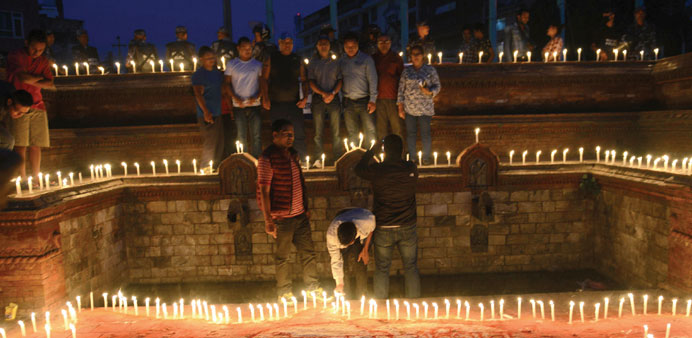Agencies/Kathmandu
Political leaders in Nepal’s southern plain regions rejected the new constitution yesterday, saying they had hoped for a clearer recognition of the region’s ethnic autonomy.
The Samyukta Lokatantrik Madheshi Morcha party would mark the text’s proclamation on Sunday as a “black day,” its leader Rajendra Mahato told a press conference in the south-eastern city of Janakpur.
The constitution had rejected the identity and rights of the people of Madhesh, as the plains are known, he said.
Copies of the text would be burned in the southern-plains in protest on Sunday, he warned.
The region was tense yesterday as authorities expected further clashes.
The latest draft text was endorsed by majority in the Constituent Assembly late Wednesday.
It is Nepal’s first constitution to be written by elected representatives, after the previous six were drafted by panels of crown-appointed experts.
Drawing up a new charter was one of the clauses of the 2006 Comprehensive Peace Accord that ended the decade-long Maoist insurgency and paved the way for the former rebels to join politics.
More than 17,000 people died in the conflict.
In the most contentious clause of the document, the text divides Nepal into seven federal states.
The divisions and have drawn protests in the southern plains, where people want a model that ensures their ethnic groups greater autonomy.
Nearly 40 people were killed in the past month of clashes, including policemen and minors. On Tuesday, a four-year-old child died in police cross-fire, and three people were fatally injured.
Leaders representing the plains-based parties boycotted Wednesday’s vote.
Nepal was putting the final touches to its long-awaited new constitution yesterday, after the approval of the draft and ahead of the proclamation of the final text, officials said.
The articles were to be rearranged and edited by the leaders of the main parties, the Political Dialogue and Consensus Committee said, after the draft was endorsed by majority in the Constituent Assembly late Wednesday.
The constitution will come into force on September 20.
“We have endorsed the country to be enshrined as a federal democratic republican state and this is no ordinary feat,” said Pushpa Kamal Dahal, a former insurgency leader and current chief of the Unified Maoist party.
Nepal’s parliament passed the new constitution on Wednesday, weeks after political leaders reached a historic agreement to create a federal state following an earthquake that killed nearly 9,000 people.
In all, 507 of the young republic’s 598 lawmakers came out in favour of the bill in the marathon vote, which began on Sunday and continued late into Wednesday night.
The new charter will replace an interim constitution in place since the end of a decade-long civil war that led to the abolition of the Hindu monarchy.
“It is an issue of pride for all Nepalis that the people’s constitution has been passed from the constituent assembly,” tweeted Prime Minister Sushil Koirala.
Koirala has already said he will step down as prime minister once the new constitution is in place, and a new government is expected to be formed.
For years the parties were unable to agree on the terms of the new charter, but Nepal’s three biggest political forces — the Nepali Congress, UML and Maoist parties — ended the deadlock in June after a 7.8-magnitude quake that killed nearly 8,900 people and destroyed around half a million homes.
“This is a historic event for Nepal but if the leaders had been a little flexible, the Madhesi, Tharu and Janajati parties that have stayed out of the process could be included,” said Lok Raj Baral, executive chairman of the Nepal Centre for Contemporary Studies. Janajatis are minority ethnic groups indigenous to Nepal.
“Ownership of the document is important. Even if it is a minority that does not accept it, the parties have to take an initiative to address the disgruntled elements,” he told AFP.
A clause that will make it more difficult for women to pass their citizenship onto their children has also attracted fierce criticism, with rights activists calling it a backwards step.

Nepalese youths light candles during an event to celebrate Nepal’s new national constitution in Kathmandu.
